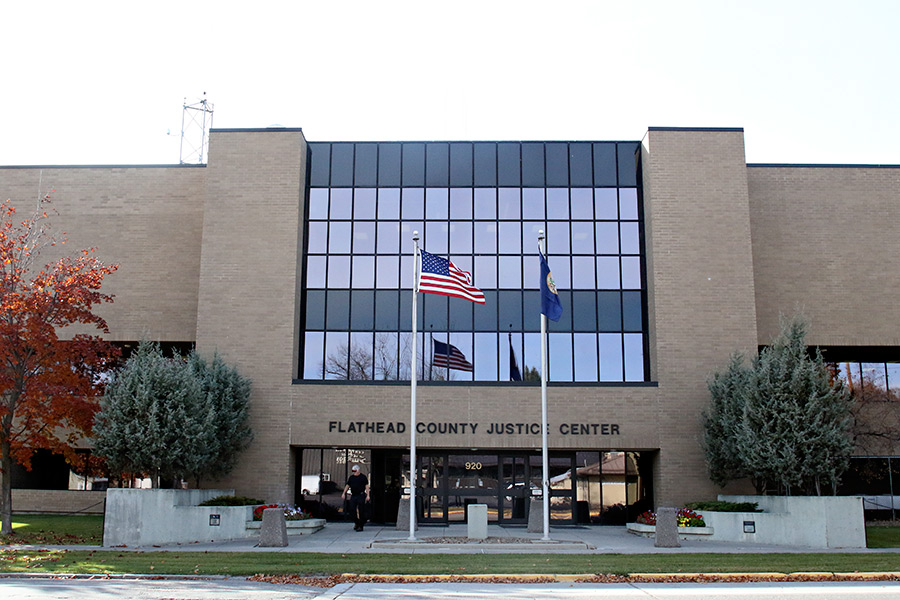After Violent Year, Changes Coming to Protect Victims of Domestic Violence
A bill advanced by Rep. Frank Garner and a new position created by the Abbie Shelter aim to improve victim support in Flathead County
By Andy Viano
Kalispell’s former chief of police stood in front of the Montana House Judiciary Committee on Feb. 22 and recounted a day forever etched in his mind.
Steadily and deliberately, he introduced committee members to a woman he did not name, and her estranged husband, a man with a years-long history of horrific abuse. He told them about their two children, just 3 and 8 years old, and a friend who was staying at her house in Olney on that awful summer day. He told them about the divorce proceeding, and the three orders of protection she had filed against her husband as the abuse escalated and the legal end of their relationship drew closer.
It was at that moment that Rep. Frank Garner’s (R-Kalispell) steady voice caught, a sudden gasp of breath wobbling him as he considered the words that would come next.
Emily Mohler, Garner said, believed Kameron Barge was going to kill her someday. And she was right.
On June 30 last year, Barge murdered his estranged wife, their 3-year-old daughter Piper and Cody Nevins, the friend who was staying with her that day. Barge took his own life a short while later.
Garner shared the story by way of introducing House Bill 449, a revision of the state’s domestic violence laws that would make it easier for judges to attach GPS monitoring to those suspected of certain domestic violence and stalking charges. By Garner’s own admission, the bill is a relatively small step toward protecting victims — judges can already place GPS monitors on suspects in many jurisdictions, including in Flathead County — but it is a step.
And it’s just one piece of an ongoing overhaul that advocates say will improve protections for abuse victims, albeit one that’s gained steam in the wake of unspeakable tragedy.

In the weeks after the triple homicide, members of the Mohler family spoke with Garner and other local lawmakers to try and turn their pain into action, and GPS monitoring became one of their main areas of focus.
House Bill 449 proposes to create a “rebuttable presumption” that suspects of several offenses — felony partner or family member assault, strangulation of a partner or family member, felony stalking, or felony violation of an order of protection — be outfitted with a GPS device in jurisdictions where such monitoring is available. In short, the “rebuttable presumption” moves the onus from the prosecution to the defense to argue why a suspect should not be monitored. It passed 18-1 out of committee and 99-0 on the House floor, and it’s expected to be taken up by the Senate later this spring.
“We saw an opportunity to raise the bar,” Garner said in an interview with the Beacon. “It essentially says, unless you can rebut that presumption, you’re going to have to have it. It’s intended to use (monitoring) more frequently in those cases.”
Those cases, however, would not have included the June triple homicide, since Barge was never charged with a felony offense. In that particular instance, the Flathead County Sheriff’s Office (FCSO) had responded to a May assault against Mohler, but Barge was never charged by the county attorney’s office. Advocates pointed a finger at muddled lines of communication between the two agencies as a reason Mohler slipped through the cracks of the legal system unprotected.
For a time, a committee made up of a sheriff’s deputy, the county’s victim advocate and a pair of deputy county attorneys would meet regularly to discuss active domestic violence cases, and flag ones like Mohler’s that had checked nearly every statistical hallmark for escalation. But that committee was inactive last summer, and a few months after Mohler’s death, county victims advocate Janiece Hamilton retired. That position has been vacant since October.
Help for survivors will be coming, however, from the nonprofit sector. The Abbie Shelter, Flathead County’s domestic violence resource, already employs a victim advocate who works with several municipal police departments and is now adding a second advocate, to be housed at the FCSO. Once the position at the county attorney’s office is filled, those three advocates should significantly improve inter-office communication and reduce the burden on each of them.
“The valley is growing, the pandemic has increased crises for local families and two court advocates is simply no longer enough for our county,” Hilary Shaw, the Abbie Shelter’s executive director, said. “The county attorney already has their own position and the sheriff’s department, that’s kind of the missing link. They need an extra pair of hands. They need someone to help follow up with victims and survivors.”
The Abbie Shelter has just begun fundraising for the new position and hopes to raise $175,000 in the next two months, an amount that will cover three years of expenses for the position. Private donors interested in contributing are asked to contact the Abbie Shelter at (406) 752-4735.
The organization is also hiring for a second position, a community advocate who Shaw says will increase the nonprofit’s “capacity to support survivors with the deepest needs and biggest barriers.” To apply for either of the new positions, visit abbieshelter.org/hiring.
Meanwhile, Shaw and Garner also recognize their work is far from finished. Garner called his legislation “the beginning” and said it was just one piece of a much larger puzzle. Shaw is pushing for increased sharing and transparency between the sheriff’s office and county attorney’s office, and the use of a standardized danger assessment that would have flagged cases like Mohler’s as particularly volatile.
Still, the progress made so far is a promising development for victim safety, even if the progress was brought about by tragedy. The deaths of Mohler, her 3-year-old daughter and Nevins were followed in December by the murder of Amanda Hillious, a mother of four who was found dead in her home. Her husband, Bradley Hillious, is awaiting trial for deliberate homicide.
“Emily, Piper and Cody’s death was the catalyst for these discussions,” Shaw said. “It’s been many months but that motivation is still the flame for this work.”
For Jan Mohler, no matter how many months it has been, thoughts of her daughter, her granddaughter and Nevins are never far from her mind. She watched from home as Garner presented House Bill 449, grateful that the former Kalispell cop never lost sight of her family either.
“I appreciate that somebody followed through,” she said. “It’s too late to save my family but hopefully it will protect others in the future, and that’s the whole point of it.”